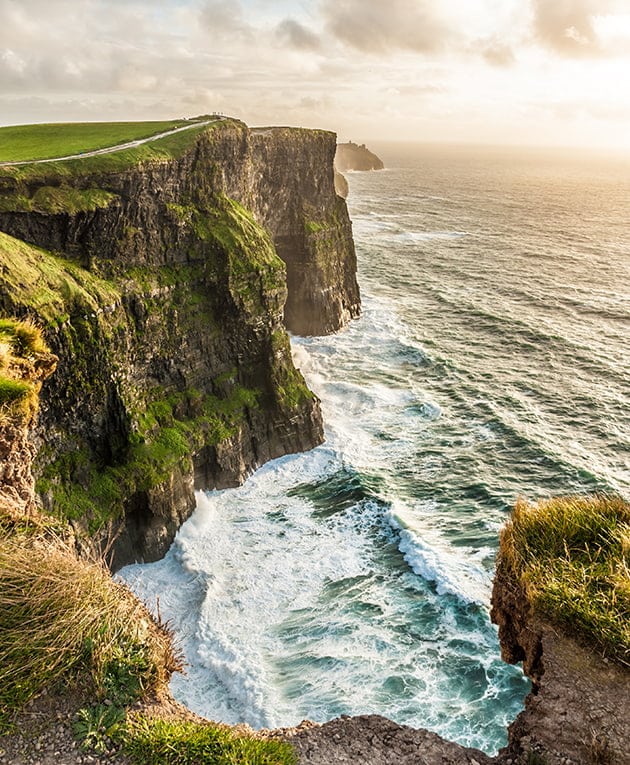-
Popular search terms
A Comprehensive Guide to Studying in:
Ireland

Dubbed the “Emerald Isle” due to its abundance of greenery, Ireland has a long and colorful history that stretches back millennia. Famed for its literature, music, and sporting excellence, the cultural influence of Ireland stretches far beyond its borders partly thanks to the huge Irish diaspora around the world. There is a certain romance about this proudly European nation, which attracts millions of visitors to its shores every year. Most visitors head for the capital and largest city, Dublin, yet Cork and Galway are also popular destinations for tourists and students alike.
Ireland’s popularity as an international study destination is growing every year, boosted by its world-class universities and status as the only English-speaking country in the European Union. Should you choose to stay here after graduation, multinational companies like Facebook, Google, Microsoft, Pfizer, and Apple all have headquarters in Ireland, offering plenty of job opportunities for talented graduates.

Frequently Asked Questions
FAQ
Did You Know? Fun Facts About Ireland
- 1 Home to tech giants like Google, Microsoft, Apple, and Facebook, Ireland hosts 9 of the top 10 US tech companies.
- 2 Ireland has one of the youngest populations in Europe, with the largest share of people under 15 as well as the highest birth rate and lowest death rate in the EU.
- 3 Besides tech companies, Ireland also houses notable firms such as Accenture, Medtronic, Guinness, and Ryanair.
- 4 With seven victories, Ireland is the most successful country at the Eurovision Song Contest.
- 5 An estimated 70 million people around the world claim to have Irish ancestry. In comparison, the total population of Ireland is 4.9 million.
Which Visas & permits do i need in Ireland
Non-EU/EEA citizens must apply for a visa to study in Ireland, specifically the “D study visa.” In your visa application, you will need to provide official documents like your letter of acceptance, proof that the course fees have been paid in full, proof of sufficient funds (EUR€7,000), and proof of medical insurance. You will also be allowed to work up to 20 hours part-time per week, or 40 hours per week during vacation periods (June to September). Visa application processing fees are EUR€60 (for a single-journey visa) and EUR€100 (for a multiple-journey visa). If you are a citizen of the EU/EEA (or other select countries), you do not need a visa to study in Ireland.
Non-EU/EEA students can also remain in Ireland post-graduation for employment purposes under the Irish Third Level Graduate Scheme. This allows non-EU/EEA graduates to stay in Ireland for up to 12 months to seek employment.
Banking in Ireland
Ireland has a modern and safe banking system that is simple and convenient. In order to open a bank account, you will need to provide proof of ID and proof of address. It is not possible to open a bank account from overseas. Maintenance fees for a student bank account will vary, but many banks offer special student rates or even “free banking.” The top Irish banks for students are KBC Bank, AIB (Allied Irish Bank), Bank of Ireland, and Revolut.
What do I need to know about healthcare in Ireland
Ireland has a dual healthcare system, with both private and public healthcare. EU/EEA students are entitled to free healthcare in Ireland, but they will need the required documentation that validates their entitlement. Thus, EU/EEA students need to obtain a European Health Insurance Card (EHIC) before they arrive in Ireland.
Non-EU/EEA students are not entitled to free healthcare in Ireland, so they must take out their own private insurance. Proof of health insurance is also required when applying for a student visa. Health insurance providers in Ireland include Irish Life Health, VHI Healthcare, and GloHealth Insurance. The cost of student health insurance in Ireland is around EUR€150-180 per year.
Housing options for students in Ireland
There are a variety of student accommodation options in Ireland, including on-campus accommodation, private off-campus student apartments, long-term student hostels, and private rented accommodation. On-campus accommodation in halls of residence is always in high demand, made up of apartments of 4-8 students, with private bedrooms and a shared kitchen, living room, and bathroom. On-campus boarding typically costs EUR€600-800 per month.
Private off-campus student apartments are a convenient and reliable alternative, in which universities partner with housing providers to offer student accommodation. This type of accommodation, however, is usually more expensive – rent can be up to EUR€10,000 for a nine-month lease. Long-term student hostels also have limited availability, but they provide a communal living area, kitchen, bathrooms, and a bedroom. Private rental accommodation, in the form of apartments, flats, or sharing a house, typically costs around EUR€1,000-1,200 per month in the city and EUR€800-900 in suburban areas.
What are the public transport options in Ireland
Transport in Ireland is made up of an impressive motorway system and nationwide public transport, which includes Bus Éireann (comprehensive bus service to all major towns), Irish Rail (rail services between major cities and towns), car rental services, and low-cost flight and ferry services. In Dublin, students can get around using Dublin Bus, the DART (Dublin Area Rapid Transit) train system, and by tram with LUAS (which means “speed” in Gaelic).
Student discounts are available on Dublin Bus, Irish Rail, DART, LUAS, and Bus Éireann. Student Travelcard is Ireland’s largest student discount card for public transport, offering discounts of up to 40% as well as 200 retail discounts nationwide. The Student Travelcard costs between EUR€12-15.
How much does a Big Mac cost in Ireland
The Big Mac Index was invented by The Economist in 1986 as an informal way of measuring the purchasing power parity (PPP) between two currencies. The price of a Big Mac in Ireland is EUR€4.10 (equivalent to US$4.40 and JP¥559). For US$50, you can buy 11 Big Macs.
Ireland has one of the highest costs of living in the world – Dublin, especially, is an expensive choice compared to some other cities and towns in Ireland. General living expenses in Dublin for one person are around EUR€902 per month, without rent.